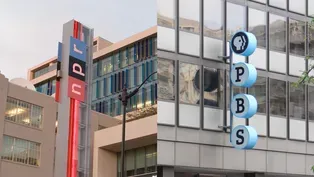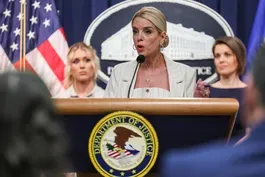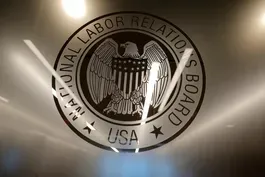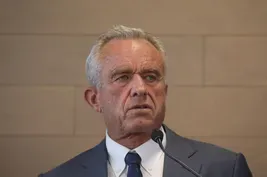
What science shows about the rise in autism diagnoses
Clip: 4/16/2025 | 7m 16sVideo has Closed Captions
What research reveals about the rise in autism diagnoses and why vaccines aren't the cause
Health Secretary Robert F. Kennedy Jr. pledged to find out what's driving the country's rise in autism spectrum disorder after a new CDC report said that rate had continued to climb. There are reports that the CDC plans to study a supposed connection between autism and vaccines, despite dozens of studies showing no connection between the two. Ali Rogin reports.
Problems with Closed Captions? Closed Captioning Feedback
Problems with Closed Captions? Closed Captioning Feedback
Major corporate funding for the PBS News Hour is provided by BDO, BNSF, Consumer Cellular, American Cruise Lines, and Raymond James. Funding for the PBS NewsHour Weekend is provided by...

What science shows about the rise in autism diagnoses
Clip: 4/16/2025 | 7m 16sVideo has Closed Captions
Health Secretary Robert F. Kennedy Jr. pledged to find out what's driving the country's rise in autism spectrum disorder after a new CDC report said that rate had continued to climb. There are reports that the CDC plans to study a supposed connection between autism and vaccines, despite dozens of studies showing no connection between the two. Ali Rogin reports.
Problems with Closed Captions? Closed Captioning Feedback
How to Watch PBS News Hour
PBS News Hour is available to stream on pbs.org and the free PBS App, available on iPhone, Apple TV, Android TV, Android smartphones, Amazon Fire TV, Amazon Fire Tablet, Roku, Samsung Smart TV, and Vizio.
Providing Support for PBS.org
Learn Moreabout PBS online sponsorshipAMNA NAWAZ: Today, Health Secretary Robert F. Kennedy Jr. pledged to find out what is driving the country's rise in autism spectrum disorder, or ASD, after a new report from the Centers for Disease Control and Prevention said that rate had continued to climb.
ROBERT F. KENNEDY JR., U.S. Health and Human Services Secretary: The ASD prevalence rate in 8-year-olds is now one in 31.
Shocking.
There's an extreme risk for boys.
Overall, the risk for boys of getting an autism diagnosis in this country is now one in 20.
AMNA NAWAZ: The CDC said the increase was most likely driven by better screening and diagnosis, which Kennedy rejected.
Separately, there are reports that the CDC plans to study a supposed connection between autism and vaccines, despite dozens of studies showing no connection between the two.
Ali Rogin digs into the science.
ALI ROGIN: Health Secretary Robert F. Kennedy Jr. has recently delivered contradictory messages on vaccines, in one interview recommending them.
QUESTION: It's one thing to say the measles vaccine is the best way of preventing spread, but it's another thing to then say, and therefore we suggest that you get the measles vaccine.
Are you... ROBERT F. KENNEDY JR.: We encourage people to get the measles vaccine.
ALI ROGIN: While, in another, again raising questions about a link between vaccines and autism that has been thoroughly studied and debunked.
ROBERT F. KENNEDY JR.: The studies that they did were very, very narrow.
ALI ROGIN: More than 25 years ago, a supposed link between autism and the measles, mumps and rubella vaccine was put forward by British doctor Andrew Wakefield, a gastroenterologist and surgeon who in 1998 authored this study in "The Lancet" medical journal.
The study was based on just 12 cases of vaccinated children, but contained no control group, patients who hadn't been vaccinated for comparison, and it relied on parents' memories, rather than official records.
It was quickly criticized for its flaws and later revealed that Wakefield hadn't disclosed conflicts of interest, that he was being paid to work on a lawsuit against vaccine companies, and that he had falsified some medical records to support his conclusion.
BRIAN DEER, Author, "The Doctor Who Fooled the World": We were able to show that he'd manipulated it, the study, and fabricated the appearance of a link with autism for personal gain and personal glory.
And the result of that was that he was banned from medicine and the research paper that he published was retracted by "The Lancet."
ALI ROGIN: Yet the alarm he created was real, leading to falling MMR rates and rising measles cases.
Researchers around the globe set out to test Wakefield's findings, with studies that track large populations over time, that compare affected groups against those without a condition and then analyze other research.
DR. MADY HORNIG, Northwell Health: We sought to confirm -- to test the hypothesis that had been raised by the findings of the Wakefield study.
DR. KUMANAN WILSON, Bruyere Health Research Institute: This was a systematic review of the existing evidence.
ALI ROGIN: Dozens of studies came to the same conclusion.
DR. KUMANAN WILSON: There was no evidence of an association between the MMR vaccine and autism.
DR. MADY HORNIG: There was no association whatsoever in our study.
ALI ROGIN: So that's what the science tells us.
But many who continue to question vaccine safety, like Kennedy, ask what then is behind the dramatic rise in autism rates?
ROBERT F. KENNEDY JR.: Autism rates have gone from one in 10,000 or one in 1,500 to one in 10,000, depending on what study you look at in my generation, as a 70-year-old man, today.
In our children, it's one in 34.
DONALD TRUMP, President of the United States: You can't even believe these numbers.
One in 10,000 children had autism, one in 10,000, and now it's one in 36.
There's something wrong, one in 36.
Think of that.
ALI ROGIN: There was one landmark 1989 study of individuals in Utah which found the rate was four in 10,000, not one in 10,000, as Trump and Kennedy said.
Official estimates began in 2000 and show the rate in children jumped from one in 150 that year to one in 31 in 2022, still a huge increase.
And researchers say there are a lot of reasons for that.
Some, we understand, but many we don't.
CHRISTINE LADD-ACOSTA, Johns Hopkins Bloomberg School of Public Health: The first is changes in how we diagnose people or who we're including as having autism.
The second is changes in recommendations from the American Association for Pediatrics to what pediatricians should be looking for in signs during wellness visits.
The third reason is due to increased awareness and acceptance of autism in our communities.
And then the fourth is changes in some trends over time for factors that we know are associated with increased likelihood of autism, things like preterm birth and fathers being older in age when they're having children.
ALI ROGIN: But those alone don't explain all of the increase.
CHRISTINE LADD-ACOSTA: Some of the things my lab studies and I focused on have been genes and how genes contribute to autism and how other environments or environmental factors also contribute to autism and brain development.
ALI ROGIN: Environmental factors like the air we breathe, what we eat and drink, infections and many more.
CHARLES NELSON, Harvard University: There are so many factors in the environment.
The question is where to look.
And when you look for one, you find that interacts with another one, right?
So, for example, what if children experiencing a lot of stress in their households is a factor that contributes to autism?
Well, maybe those very families are the ones using more screens.
So is it the stress or is it screen time?
ALI ROGIN: Researchers are now working to determine what these many factors could be and how they might interact with many genes to cause autism.
Some are also studying how to detect autism even earlier in life using brain wave analysis on infants well before behavioral signs show up.
CHARLES NELSON: The reason this work is so important is that it may give us a way to predict in the first half-year of life which babies will go on to develop autism.
And if we can do that, then we, A, can scale this up throughout the United States in pediatric clinics, for example, and, B, we can start to develop interventions that can be used in babies as young as 3 to 6 months of age.
ALI ROGIN: Researchers say this should be the focus going forward, not another study looking for a connection between vaccines and autism.
DR. KUMANAN WILSON: At the population level, it's been answered.
There have been innumerable studies, in fact, to such a point that they have actually stopped conducting the studies, from what I could see, or at the same extent that they had been before because the conclusions are always the same.
CHARLES NELSON: This question has been so thoroughly investigated.
One could argue, why throw even more money at a question that has been answered, when that money could be better spent trying to figure out what does cause autism, not what doesn't cause autism?
ALI ROGIN: For the "PBS News Hour," I'm Ali Rogin.
Activist supports Sudanese sexual violence survivors
Video has Closed Captions
Activist provides support for Sudanese refugees terrorized by sexual violence (9m 7s)
Deportation challenge morphs into executive power battle
Video has Closed Captions
Challenge to Trump deportations morphs into a battle over executive and judicial power (5m 42s)
A look at the efforts to slash public media funding
Video has Closed Captions
A look at the Trump administration's efforts to slash public media funding (5m 29s)
News Wrap: DOJ sues Maine over transgender athletes
Video has Closed Captions
News Wrap: DOJ sues Maine over transgender athletes (6m 7s)
NLRB whistleblower says DOGE may have caused security breach
Video has Closed Captions
NLRB whistleblower claims Musk's DOGE potentially caused significant security breach (8m 29s)
Researcher skeptical autism cause will be found by September
Video has Closed Captions
'Good science takes time': Researcher skeptical autism cause will be found by September (5m 11s)
U.S. and Iran harden positions ahead of nuclear negotiations
Video has Closed Captions
Ahead of 2nd round of nuclear negotiations, U.S. and Iran harden positions (4m 14s)
Providing Support for PBS.org
Learn Moreabout PBS online sponsorshipSupport for PBS provided by:
Major corporate funding for the PBS News Hour is provided by BDO, BNSF, Consumer Cellular, American Cruise Lines, and Raymond James. Funding for the PBS NewsHour Weekend is provided by...


















